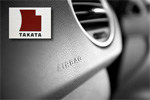 The National Highway Traffic Safety Administration (NHTSA) has not obtained a court order forcing a recall by an auto company or parts supplier in more than 35 years.
The National Highway Traffic Safety Administration (NHTSA) has not obtained a court order forcing a recall by an auto company or parts supplier in more than 35 years.
That the NHTSA is considering such a move demonstrates how serious the federal agency takes the Takata airbag recall injuries.
Takata, a Japanese airbag supplier whose airbags have been found to improperly explode and injure vehicle occupants, has limited recalls of their airbags to hot and humid geographical regions.
Takata has argued that a national recall is not required because the defective airbags are only dangerous in hot and humid regions. The NHTSA on the other hand has demanded that the auto supplier widen its recall nationally, and thereby force all auto companies to follow suit.
In its latest response to the NHTSAs request that the company expand the recall, Takata seemed ambivalent. In an announcement on Dec. 3, the company said it was willing to cooperate but did not act on the NHTSAs actual request.
The NHTSA seems to have interpreted this as a refusal and has vowed to use the court system to compel Takata to act. On Dec. 16, NHTSA Deputy Chief David Friedman announced that the agency would be willing to go to court in order to compel the recall of an additional 5 million vehicles that are not covered by existing recalls.
The additional vehicles are cars that are produced by Ford, Chrysler, and BMW. The actual steps necessary to compel an auto supplier to recall vehicles is long and arduous and it may take many months or years.
If the NHTSA were to seriously pursue this process, these would be the steps:
- Issue a formal demand
- Respond to the automaker
- Convene a public hearing
- File suit in U.S. District Court
Two automakers, Honda Motor Co. and Mazda Motor Co., have recalled their vehicles nationally on their ow. The Takata airbag recall saga continues. The issue will become only more complicated moving forward. It is possible that the Takata airbag recall issue could set some new precedents.